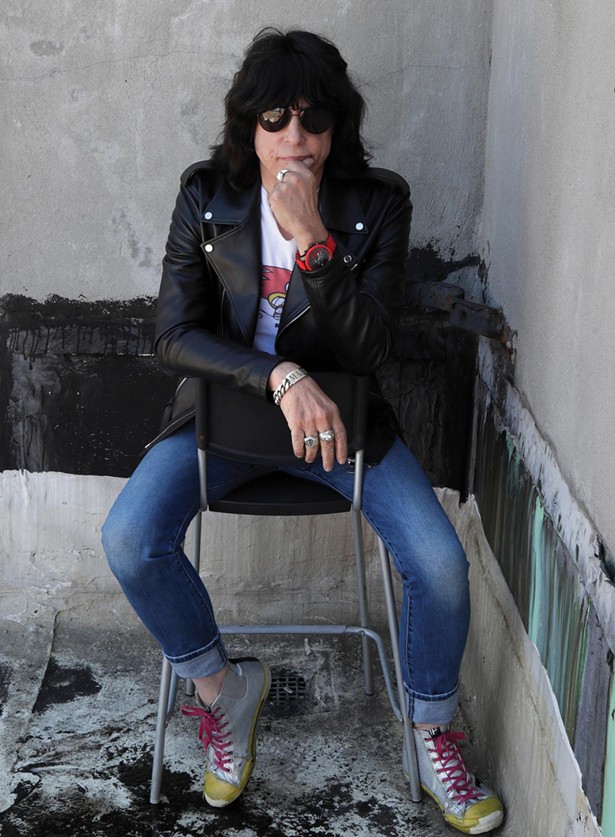The Ramones saved rock 'n' roll. While the band had their pioneering peers in the nascent mid-1970s punk scenes in their native New York as well as in the UK and other pockets of the world—some of whom hit Top 40 heights that the Queens-birthed quartet never attained—it was their 1976 debut album, simply titled Ramones, that provided the true template of punk rock's everyman sound.
During a dismal point in pop history, when rock had been taken over by middle-of-the-road, brown-bread fluff and bloated virtuosos, the Ramones brought it all back home, inspiring millions to pick up instruments and give music a try. Although the group called it a day in 1996 and all four original members have since passed on, second drummer Marky Ramone keeps the fast 'n' furious flame burning.
Born Mark Bell in 1952, he got his start in 1969 with the hard rock trio Dust and went on to Wayne County and the Backstreet Boys and Richard Hell and the Voidoids before replacing founding member Tommy Ramone in the Ramones in 1978. That year's Road to Ruin, home to the signature anthem "I Wanna Be Sedated," marked Marky's first recorded appearance as a member of the "Fast Four." He exited the Ramones in 1983 but returned in 1987 to tour and record with them until their farewell. Marky next played in the Misfits and on solo albums by Joey and Dee Dee Ramone before launching his own bands; he now hosts "Marky Ramone's Punk Rock Blitzkrieg" on Sirius XM. Marky Ramone's Blitzkrieg will bring their "Holiday Blitzkrieg" to Daryl's House in Pawling on December 10 at 7pm. Tickets are $30. The drummer answered the questions below via email.
—Peter Aaron
You joined the Ramones 45 years ago, and it's been almost 30 years since the quartet played its last show. Whenever you have a quiet moment to reflect on how much of your life has been dedicated to the group, what kind of emotions come up for you?
I am very grateful to have the career that I have, but, at the same time, I try to keep myself busy and not to reflect too much on the past. I prefer to just live in the moment. With that being said, of course I still dearly miss all of my band mates.
Who are some of the drummers that influenced you coming up as a young player?
My influences were Ringo Starr, Hal Blaine from the Wrecking Crew, Buddy Rich, Joe Morello of the Dave Brubeck band, Ginger Baker, and Mitch Mitchell. If you combine all of these guys' styles together like food ingredients, then the dish that comes out is Marky Ramone.
It's been said that while the Ramones' music comes across to many people as being very straightforward and simple, from a musician's standpoint it's actually very difficult music to play correctly. Do you agree, and if so, what is it that makes this the case with the band's music?
I occasionally hear people say that Ramones music is simple and straightforward until they actually try to play it themselves. In reality, I know very technical guitar players and drummers who can't play so many eighth-note downstrokes continuously and a 1234 count to each song so there's no time for stopping. It's a non-stop barrage of music played at a very fast level. It's not easy and it takes time to develop the strength to do it but the more you do it, the easier it becomes. Believe me though, there's not that many people that can do it correctly and accurately.
You've been playing since 1971, when you were in high school. At age 71, what keeps rock 'n' roll fresh and challenging for you? What has it taught you, as a person as well as a musician, and what do you get from it now that perhaps you didn't get from it as a teenager?
When I was young, seeing the Beatles on "The Ed Sullivan Show" is what had initially challenged me, because from that moment I wanted to start playing the drums. Throughout my life, I've always been on a constant journey to learn different drumming styles and different genres of music like jazz, blues, rock, etc. In high school I played heavy metal, but then I did a country rock album [1973's eponymous album by Estus]. I also did a blues album with Johnny Shines and Co. [1974], and it was always an adventure for me to be able to adapt to different styles. As a musician, you always have to be open to learn new things, because that's what makes playing a musical instrument so interesting.
Purely as a music fan, what is it about the Ramones' songs that makes them so enduring? What do you most hope people get from coming to see your band perform them?
I just like seeing people have a good time, and the music of the Ramones continues to endure because of the lyrical content of the songs and the energy of the band itself. It's non-stop like a locomotive and a lot of people connect with that. Whether it's older fans that grew up with it or newer fans that continue to hear it for the first time, something about this music resonates with people. For me, it feels great to continue to perform this type of high-energy music with my band.













